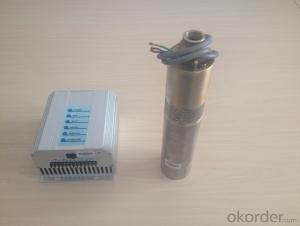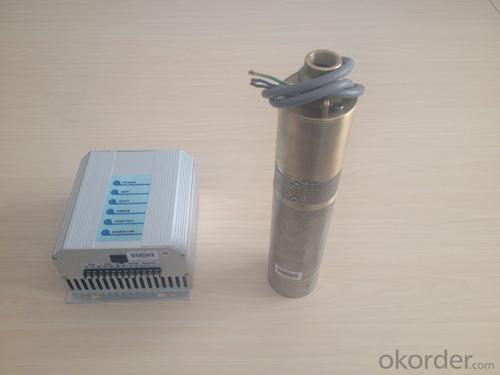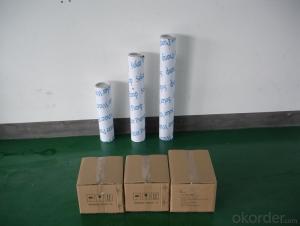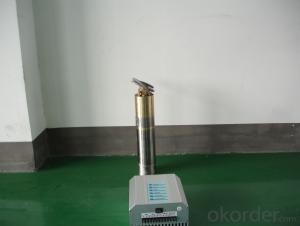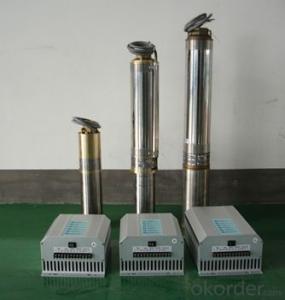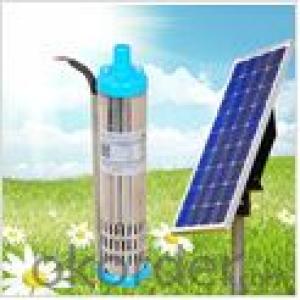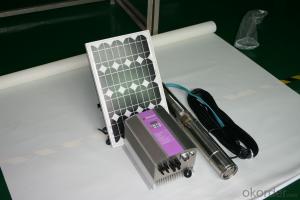Solar Pump Station - DC Solar Submersible Water Pumps
- Loading Port:
- China Main Port
- Payment Terms:
- TT OR LC
- Min Order Qty:
- -
- Supply Capability:
- -
OKorder Service Pledge
OKorder Financial Service
You Might Also Like
Item Description :
This superb new addition to our solar fountain range comes with a 10w solar panel,and a powerful fountain pump that is capable of producing fountains of up to 2m in height. As well as being easy to set up and use.Instruction manual is supplied for assembly and maintenance.
Solar Fountain Key Features :
Powered by direct sunlight
No high voltage electric mains required
Safe for children
Max. height of fountain: 2M
Max. flow capacity: 800 L/H(176 GAL)
10W Polycrystalline solar panel included
18V DC brushless pump
Solar Pump Features :
Can produce fountains up to : 2M (tube height) 1.4M (fountain height)
Comes with multiple nozzle accessories
Cable Length : 5M
Solar Panel Features :
10W peak power.
Polycrystalline highly efficient solar panel
Comes mounted in aluminium frame
Comes with ground stake and rotating knob so you can angle your panel toward the sun
What You Will Get :
10W solar panel
Solar pump
Ground Sake
Nozzle accessories
Precautions :
DO NOT alter or change the product itself or its components
Operate pump in freshwater only, never above 50 degrees celsius
Keep away from flammable liquids
Do not connect to any other power supply other than the included
- Q: Can solar pumps be used for geothermal heating or cooling systems?
- No, solar pumps are not typically used for geothermal heating or cooling systems. Geothermal systems rely on the natural heat stored in the ground, while solar pumps are designed to utilize solar energy for pumping water or other fluids. Geothermal systems typically involve specialized equipment and technologies specifically designed for geothermal applications.
- Q: How does a solar pump handle water with high levels of oil or petroleum contaminants?
- A solar pump is not specifically designed to handle water with high levels of oil or petroleum contaminants. These contaminants can potentially damage the pump's components and hinder its performance. It is recommended to use a pump specifically designed for handling oil or petroleum-contaminated water, such as an oil-water separator, for effective removal of these contaminants before using a solar pump.
- Q: Can a solar pump be used in areas with low water tables?
- Yes, a solar pump can be used in areas with low water tables. Solar pumps are designed to draw water from various sources, including shallow wells, lakes, rivers, and even underground water tables. The efficiency of the solar pump may depend on the depth and availability of water, but it can still be a viable option in areas with low water tables.
- Q: How does a solar pump handle water source contamination from chemical spills?
- A solar pump does not have the ability to handle water source contamination from chemical spills directly. However, it can help in situations where contaminated water needs to be removed or pumped away from the affected area, minimizing further spread of the contamination.
- Q: Can a solar pump be used for residential purposes?
- Yes, a solar pump can be used for residential purposes. Solar pumps are an environmentally friendly and cost-effective alternative to traditional pumps that run on electricity or fuel. They use energy from the sun to power the pump, eliminating the need for grid electricity or fuel consumption. Solar pumps can be used for various residential purposes such as supplying water for domestic use, irrigation, livestock watering, and swimming pool circulation. They are especially useful in remote or off-grid areas where access to electricity is limited or expensive. Additionally, solar pumps require minimal maintenance, have a long lifespan, and can significantly reduce energy costs for homeowners.
- Q: What is the required maintenance for the pump controller?
- To ensure optimal performance and longevity, it is necessary to conduct regular maintenance on a pump controller. The maintenance tasks for a pump controller include inspections, cleaning, testing, electrical checks, software updates, calibration, and lubrication. Here are some key maintenance steps to follow: 1. Inspections: Regularly examine the pump controller for any visible signs of damage, such as loose connections, worn-out wires, or corrosion. This will help identify and address any issues promptly. 2. Cleaning: Keep the pump controller clean by removing dirt, dust, or debris. Use a soft cloth or brush to gently clean the exterior and ensure proper ventilation. Avoid using harsh chemicals or abrasive materials that may damage the controller. 3. Testing: Periodically test the pump controller to verify its functionality. This involves checking the control panel, switches, and buttons to ensure they are operating correctly. Additionally, test the pump controller's communication capabilities, such as remote monitoring or data logging. 4. Electrical Checks: Inspect the wiring and electrical components of the pump controller to ensure they are secure and functioning properly. Look for signs of overheating, loose connections, or frayed wires that may pose safety hazards or affect the pump's performance. 5. Software Updates: If the pump controller utilizes software or firmware, regularly check for updates provided by the manufacturer. Keeping the software up to date can enhance the controller's performance, introduce new features, and address any known issues or vulnerabilities. 6. Calibration: Depending on the application, some pump controllers may require periodic calibration to maintain accurate measurement and control of flow rates, pressure, or other parameters. Consult the manufacturer's guidelines for specific calibration procedures. 7. Lubrication: If applicable, ensure that any moving parts within the pump controller are properly lubricated. Follow the manufacturer's instructions regarding the type of lubricant to use and the recommended intervals for reapplication. Always adhere to the manufacturer's guidelines and recommendations for your specific pump controller model. Regular maintenance will extend the pump controller's lifespan, enhance its efficiency, and minimize the risk of unexpected failures.
- Q: Are there any noise or vibration concerns with using a solar pump?
- No, there are typically no noise or vibration concerns with using a solar pump. Unlike traditional pumps that rely on mechanical components and motors, solar pumps operate using photovoltaic panels to convert sunlight into electricity. This means that they operate silently and without any moving parts, eliminating any noise or vibration. Solar pumps are designed to be environmentally friendly and energy-efficient, providing a quiet and efficient solution for pumping water or other fluids.
- Q: How does a solar pump help in reducing the use of herbicides?
- A solar pump helps in reducing the use of herbicides by providing an alternative method for irrigation that relies on renewable energy instead of traditional fuel-powered pumps. By using solar power to operate the pump, farmers can efficiently water their crops without the need for herbicides to control weed growth. Thus, reducing the reliance on herbicides and promoting an environmentally friendly approach to agriculture.
- Q: What is the cost of installing a solar pump?
- The cost of installing a solar pump can vary depending on various factors such as the size and capacity of the pump, the location and accessibility of the installation site, additional components required, and any necessary permits or labor costs. Generally, the cost can range from a few thousand to tens of thousands of dollars. It is recommended to consult with solar pump suppliers or installers to get a more accurate estimate based on individual requirements.
- Q: What maintenance is required for a solar pump?
- Regular maintenance is required for a solar pump, which includes cleaning the solar panels to ensure optimal sunlight absorption, inspecting the pump for any signs of damage or wear, checking the connections and wiring for any loose or corroded parts, and monitoring the water levels and pressure regularly. Additionally, it is important to keep the surrounding area clear of debris or obstructions to ensure proper functioning of the pump.
Send your message to us
Solar Pump Station - DC Solar Submersible Water Pumps
- Loading Port:
- China Main Port
- Payment Terms:
- TT OR LC
- Min Order Qty:
- -
- Supply Capability:
- -
OKorder Service Pledge
OKorder Financial Service
Similar products
Hot products
Hot Searches
Related keywords
